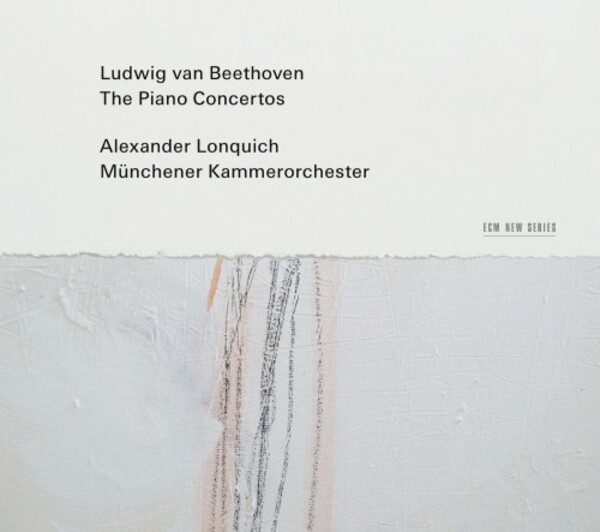BEETHOVEN Piano Concertos (Alexander Lonquich)
View record and artist detailsRecord and Artist Details
Genre:
Orchestral
Label: ECM New Series
Magazine Review Date: 01/2025
Media Format: CD or Download
Media Runtime: 175
Mastering:
DDD
Catalogue Number: 487 6904

Tracks:
| Composition | Artist Credit |
|---|---|
| Concerto for Piano and Orchestra No. 2 |
Ludwig van Beethoven, Composer
Alexander Lonquich, Piano Munich Chamber Orchestra |
| Concerto for Piano and Orchestra No. 1 |
Ludwig van Beethoven, Composer
Alexander Lonquich, Piano Munich Chamber Orchestra |
| Concerto for Piano and Orchestra No. 3 |
Ludwig van Beethoven, Composer
Alexander Lonquich, Piano Munich Chamber Orchestra |
| Concerto for Piano and Orchestra No. 4 |
Ludwig van Beethoven, Composer
Alexander Lonquich, Piano Munich Chamber Orchestra |
| Concerto for Piano and Orchestra No. 5, 'Emperor' |
Ludwig van Beethoven, Composer
Alexander Lonquich, Piano Munich Chamber Orchestra |
Author: Patrick Rucker
In his booklet note, pianist and conductor Alexander Lonquich writes that this recording grew out of his long and cordial relationship with the Munich Chamber Orchestra, culminating in autumn 2019, when together they performed the cycle of Beethoven’s five piano concertos in one evening. Undoubtedly, those circumstances give this cycle an unusual unity of focus and intent.
From the opening orchestral tutti of the B flat Second Concerto – the earliest of the five canonical concertos – it is clear that a separate and specialist orchestral conductor would bring a more acute ear to balances. That said, Lonquich’s approach to the solo part is extrovert and brilliant. His tendency to over-interpret, however, leads him into some curiously anachronistic, end-of-bar crescendos in the development. The singing quality he brings to the extended recitatives of the Adagio is particularly effective. In the Rondo, when Beethoven cleverly throws the main theme off the beat by a quaver, Lonquich scuttles the joke by slowing the entire section to an andante, disorientating the listener and snapping the rhythmic impetus of the movement.
Perhaps the outstanding feature of the C major First Concerto is the first-movement cadenza. Apparently concocted from both of Beethoven’s two extant cadenzas plus additional material, it accounts for a curiously disproportionate quarter of the movement’s entire running time. There’s the sense, with the arrival of the C minor Third Concerto, that the series has hit its stride. The dialogue between soloist and orchestra is particularly fine in the first movement. By the Largo, however, some of the fuzzy orchestral balances have returned, despite some genuinely heartfelt music-making. The Allegro of the Rondo is rather more leisurely than customary, though this allows more audible detail.
Buoyant airiness surrounds the Allegro moderato of the G major Fourth Concerto, which features some exquisite playing from the winds. When the truculence of the development arrives, the contrast becomes especially vivid. Lonquich’s articulation is apt throughout. All concerned acquit themselves magnificently in that most eloquent of all concerto slow movements, the Andante con moto. Alas, come the Vivace, we start to yearn once again for more precise leadership of the ensemble, enabling greater rhythmic accuracy and finesse of balance and contour. A detailed description of this performance of the Emperor Concerto would necessarily reiterate many of the observations already made.
This is an interesting and thought-provoking set. Naturally in Beethoven’s day it was customary in concerto performances for the soloist and concertmaster to share responsibility for leading the ensemble. Our ears of course are accustomed to another paradigm, that of a soloist involved exclusively with his or her instrument and a conductor overseeing the orchestra. Moreover, the performances discussed here use modern instruments. With these considerations in mind, some of Lonquich’s ideas will strike as apt and particularly in the spirit of Beethoven, while others may seem eccentric and far afield. Ultimately, one finds a modicum of received wisdom here, alongside a great deal of fresh and stimulating thought.
Discover the world's largest classical music catalogue with Presto Music.

Gramophone Digital Club
- Digital Edition
- Digital Archive
- Reviews Database
- Full website access
From £8.75 / month
Subscribe
Gramophone Full Club
- Print Edition
- Digital Edition
- Digital Archive
- Reviews Database
- Full website access
From £11.00 / month
Subscribe
If you are a library, university or other organisation that would be interested in an institutional subscription to Gramophone please click here for further information.




